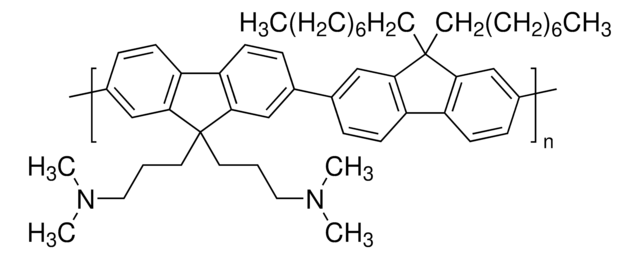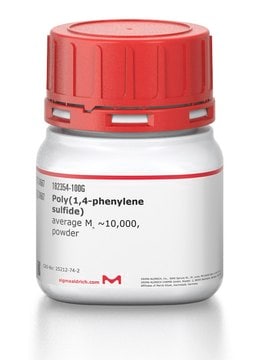659223
Poly(2,5-bis(3-sulfonatopropoxy)-1,4-phenylene, disodium salt-alt-1,4-phenylene)
light emitting, fluorescence λem 424 nm in H2O
Synonym(s):
(−)PPP
Sign Into View Organizational & Contract Pricing
All Photos(1)
About This Item
Recommended Products
Quality Level
form
solid
solubility
H2O: soluble
λmax
208 nm (in deoxygenated water)(lit.)
fluorescence
λex 322 nm; λem 424 nm in H2O
λex 363 nm; λem 410 nm in H2O(lit.)
λem 424 nm in H2O
General description
Poly(2,5-bis(3-sulfonatopropoxy)-1,4-phenylene, disodium salt-alt-1,4-phenylene) (PPP-OPSO3) is a water soluble conjugating polymer that can be used as a donor molecule. It has a poly(p-phenylene) skeleton with each repeating unit having two phenylene groups. It can be used for a variety of optoelectronic applications.
Application
PPP-OPSO3 is a π-conjugating polymer that can be used in organic light emitting diodes (OLEDs), thin film transistors (TFTs), and flexible organic solar cells.
A water-soluble polyanionic blue-light emitting polymer.
Features and Benefits
Ready to use, water-soluble light, emitting material, more soluble than MPS-PPV.
related product
Product No.
Description
Pricing
Signal Word
Warning
Hazard Statements
Precautionary Statements
Hazard Classifications
Eye Irrit. 2 - Skin Irrit. 2 - STOT SE 3
Target Organs
Respiratory system
Storage Class Code
11 - Combustible Solids
WGK
WGK 3
Flash Point(F)
Not applicable
Flash Point(C)
Not applicable
Personal Protective Equipment
dust mask type N95 (US), Eyeshields, Gloves
Choose from one of the most recent versions:
Already Own This Product?
Find documentation for the products that you have recently purchased in the Document Library.
Room-Temperature Phosphorescence From Films of Isolated Water-Soluble Conjugated Polymers in Hydrogen-Bonded Matrices
Al-Attar HA and Monkman AP
Advances in Functional Materials, 22(18), 3824-3832 (2012)
Conjugated Polymer Nanoparticles Having Modified Band Gaps Assembled into Nano-and Micropatterned Organic Light-Emitting Diodes
Herrera M, et al.
ACS Applied Nano Materials, 2(1), 577-585 (2018)
Controlled energy transfer between isolated donor-acceptor molecules intercalated in thermally self-ensemble two-dimensional hydrogen bonding cages
Al Attar HA and Monkman AP
Physical Review. B, Condensed Matter and Materials Physics, 86(23), 235420-235420 (2012)
Reynolds, J.R., et al.
Macromolecules, 31, 964-964 (1998)
Our team of scientists has experience in all areas of research including Life Science, Material Science, Chemical Synthesis, Chromatography, Analytical and many others.
Contact Technical Service
![Poly[5-methoxy-2-(3-sulfopropoxy)-1,4-phenylenevinylene] potassium salt solution 0.25 wt. % in H2O](/deepweb/assets/sigmaaldrich/product/structures/111/584/9e24dfe5-3cb6-4bd8-8bc6-cbe82c1b88cd/640/9e24dfe5-3cb6-4bd8-8bc6-cbe82c1b88cd.png)

![[6,6]-Phenyl C61 butyric acid methyl ester ≥99%](/deepweb/assets/sigmaaldrich/product/structures/359/221/d990c746-0960-4c69-bf76-fe09b193824d/640/d990c746-0960-4c69-bf76-fe09b193824d.png)






